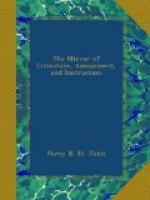Why is Christmas-day so called?
Because of its derivation from Christi Missa, the mass of Christ; and thence the Roman Catholic Liturgy is termed their Missal, or Mass-book. About the year 500 the observation of this day became general in the Catholic Church.
Why was the word Yule formerly used to signify Christmas?
Because of its derivation from the word ol, ale, which was much used in the festivities and merry meetings of this period; and the I in Iol, icol. Cimb. as the ze and zi in zehol, zeol, ziol, Sax. are premised only as intensives, to add a little to the signification, and make it more emphatical. Ol, or Ale, did not only signify the liquor then made use of, but gave denomination to the greatest festivals, as that of zehol, or Yule, at Midwinter; and as is yet plainly to be discovered in that custom of the Whitsun ale at the other great festival.
Why are certain initials affixed to crucifixes?
Because of their signifying the titular tributes paid to the Saviour of the world. Thus, I.N.R.I. are universally agreed to be the initials of the Latin words Jesus Nazarenus Rex Judaeorum; i.e. Jesus of Nazareth, King of the Jews, a title which Pilot wrote and affixed to the cross.—See John, ch. xix. The initials I.H.C., appended to other crosses, are said to imply, Jesus Humanitatis Consolator, Jesus the Consoler of Mankind; and the I.H.S. imply Jesus Hominum Salvator, Jesus the Saviour of Men. The first-mentioned initials are, however, found on the most ancient crosses.
Why is a certain song called a carol?
Because of its derivation from cantare, to sing, and rola, an interjection of joy.—Bourne.
Bishop Taylor observes that the “Gloria in excelsis,” the well-known hymn sung by the angels to the shepherds at our Lord’s nativity, was the earliest Christmas carol. Bourne cites Durand to prove that in the earlier ages of the churches, the bishops were accustomed, on Christmas-day, to sing carols among their clergy. Fosbroke says—“It was usual, in ancient feasts, to single out a person, and place him in the midst, to sing a song to God.” And Mr. Davies Gilbert, late President of the Royal Society, in a volume which he has edited on the subject, states, that till lately, in the West of England, on Christmas-eve, about seven or eight o’clock in the evening, festivities were commenced, and “the singing of carols begun, and continued late into the night. On Christmas-day, these carols took the place of psalms in all the churches, especially at afternoon service, the whole congregation joining; and at the end it was usual for the parish-clerk to declare, in a loud voice, his wishes for a merry Christmas and a happy new year to all the parishioners.”




